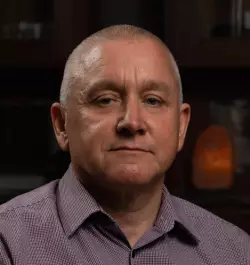We hebben het geluk om hele fijne en wijze buren te hebben en gisterenavond waren we uitgenodigd bij Anna en Leon, hun vrienden Panagiotis and Eleftheria waren er ook.
Leon en Panos zijn "Griekse filosofen" en Leon sprak over het gedicht "Ithaka" van Constantine P. Cavafy".
We are fortunate to have very kind and wise neighbors, and last night we were invited to Anna and Leon's home, along with their friends Panagiotis and Eleftheria who were also there.
Leon and Panos are "Greek philosophers", and Leon spoke about the poem "Ithaka" by Constantine P. Cavafy.
Dit gedicht, doordrenkt met wijsheid en filosofische diepgang, nodigt ons uit om de reis van het leven te omarmen, in plaats van ons enkel te focussen op de eindbestemming.
Stel je voor dat je op weg bent naar Ithaka, een symbool voor je ultieme doelen en ambities in het leven. Onderweg kom je obstakels en uitdagingen tegen – misschien zijn het de moderne equivalenten van de Laistrygonen, Cyclopen en een woedende Poseidon. Deze momenten van strijd en avontuur zijn niet zomaar hindernissen; ze zijn de kern van je reis. Ze brengen je waardevolle lessen, ervaringen en wijsheden die je leven verrijken.
In de hectiek van ons dagelijks bestaan kunnen we gemakkelijk vergeten dat het leven meer is dan het bereiken van onze doelen. We haasten ons van de ene mijlpaal naar de andere, in de hoop dat het volgende succes ons de ultieme vervulling zal brengen. Maar "Ithaka" herinnert ons eraan dat het niet de bestemming is die het belangrijkst is, maar de reis ernaartoe.
Elke stap die we zetten, elke ervaring die we opdoen – of het nu een vreugdevolle overwinning of een pijnlijke les is – draagt bij aan onze groei en wijsheid. Het leven, in al zijn facetten, is een reis vol betekenis. De schoonheid van ons bestaan ligt in het volledig beleven van deze reis, met al zijn ups en downs.
En uiteindelijk, als we onze eigen Ithaka bereiken – de voltooiing van onze levensreis – zullen we beseffen dat het niet het eindpunt was dat ons leven waarde gaf. Het was de weg ernaartoe, met al zijn avonturen en ervaringen, die ons leven vervulde en verrijkte.
Dus laten we elke dag bewust beleven, dankbaar zijn voor de lessen die we leren en genieten van de reis, ongeacht de bestemming. Want in de woorden van Cavafy: "Het is de reis die telt, niet de bestemming."
This poem, imbued with wisdom and philosophical depth, invites us to embrace the journey of life rather than solely focusing on the final destination.
Imagine you are on your way to Ithaka, a symbol for your ultimate goals and ambitions in life. Along the way, you encounter obstacles and challenges – perhaps the modern equivalents of the Laestrygonians, Cyclops, and an angry Poseidon. These moments of struggle and adventure are not just hindrances; they are the essence of your journey. They bring valuable lessons, experiences, and wisdom that enrich your life.
In the busyness of our daily lives, we can easily forget that life is more than just reaching our goals. We rush from one milestone to the next, hoping that the next success will bring us ultimate fulfillment. But "Ithaka" reminds us that it is not the destination that matters most, but the journey itself.
Every step we take, every experience we gain – whether it is a joyful victory or a painful lesson – contributes to our growth and wisdom. Life, in all its facets, is a journey full of meaning. The beauty of our existence lies in fully living this journey, with all its ups and downs.
And ultimately, when we reach our own Ithaka – the completion of our life's journey – we will realize that it was not the endpoint that gave our life value. It was the journey, with all its adventures and experiences, that fulfilled and enriched our lives.
So let's live each day consciously, be grateful for the lessons we learn, and enjoy the journey, regardless of the destination. For in the words of Cavafy: "It is the journey that counts, not the destination."



